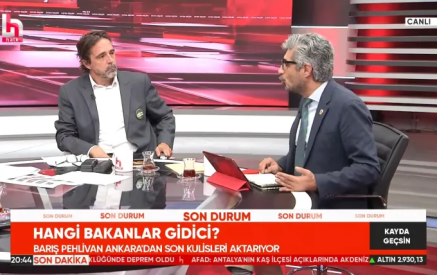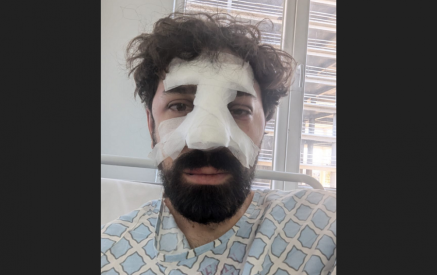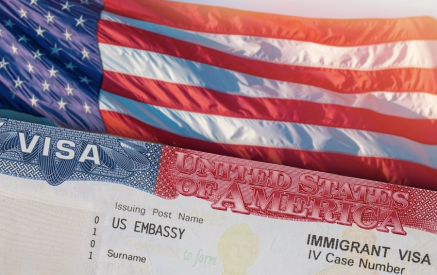In one scene, the main character starts a conversation with his police security detail in Germany, telling the man charged with protecting him from attack how he misses his dog, left behind in Turkey. “The policeman I had the conversation with in real life was sitting next to me, and we both realized how close we got,” Dündar said.
The moment Dündar described was symbolic: getting close to a police officer and sharing an emotional moment was unimaginable in Turkey, where police are a constant source of fear. It demonstrated how much life in exile is different from the one left behind in Turkey, but at the same time highlighted the persistence of threats. I spoke with Dündar and two other Turkish journalists living in Berlin about their work and life in exile and the dangers they face in their new environment.
“One big difference is how the blue light and sounds of the police cars in the street during the night do not worry me any longer,” Hayko Bağdat told me. He left Turkey with his family and settled in Berlin in 2017 after being threatened and investigated by Turkish authorities because of his reporting, especially after the attempted coup against President Recep Tayyip Erdoğan in July 2016. “On coming to Germany, I could finally sleep normally during the nights,” Bağdat said.
Read also
Zübeyde Sari, a relative newcomer to Berlin having arrived in December 2018, told me how much relief it was for her not to have to deal with authorities because of her reporting. “I only have to meet authorities when I do my paperwork concerning my stay here,” she said.

While all three journalists expressed relief over not having to continuously fear Turkish authorities, other risks remain. “Threats are my destiny,” Bağdat said sarcastically, noting the number of daily threats he receives on social media has not changed since he moved to Germany. “I get hundreds of harassing social media messages daily, some of them clear threats and sometimes direct death threats too,” Bağdat said.
In Turkey, Bağdat had a talk show on national broadcaster IMC TV, wrote columns for the now-banned Turkish investigative daily Taraf, the Armenian weekly Marmara and the news website Diken. He is active on social media with more than a million Twitter followers. “I am a hate subject first because I am Armenian and second because of the criticism I have toward the Turkish government,” he said.
Dündar, the former editor-in-chief of Cumhuriyet newspaper and a recipient of CPJ’s 2016 International Press Freedom Award, is one of the most prominent Turkish journalists in exile. He had to leave his country in June 2016 after he was continuously harassed by authorities and sentenced to prison on charges of revealing state secrets for a report alleging that Turkey had tried to ship arms to Islamists in Syria. “I have an arrest warrant against me in Turkey,” he said.
For Dündar, threats are not always virtual. His face is well known across Turkey and among the Turkish community in Germany where, a 2018 study found, the roughly 3 million people with Turkish roots feel more strongly connected to Turkey than to Germany, and around two-thirds of them support Erdoğan. In Berlin, Dündar founded and manages a nonprofit online radio station and newsletter called Özgürüz (“We are free”), banned in Turkey, as well as writing regular columns in German newspapers and publishing books. “I get regular insults in the street from ordinary people, taxi drivers who are often Turks in Berlin call me traitor, people sometimes take photos and videos of me walking in the street and put them online,” Dündar said. On one occasion, a Turkish TV crew showed up at the door of his office, filmed him, and put the address on the internet. Dündar said he thinks more and more of moving to London where the Turkish community is more diverse and he might be less exposed to such harassment.

“When I meet someone here, it is difficult to speak about Turkey as they sympathize with the Erdoğan government but I know that they are far from the Turkish reality, they just get their information from the propaganda,” said Zübeyde Sari, who is a reporter and producer at Dündar’s Özgürüz radio. She feels hostility from the local Turkish community toward new emigres, and is harassed on her social media accounts. Prior to coming Germany, she worked as a reporter at IMC TV and earlier with BBC Türkçe, where her coverage included opposition movements and protests.
Both Dündar and Bağdat live under some kind of police protection because of various risks, from the Turkish intelligence agency’s
“There are periods when German police think the danger is so great that I have to be accompanied by security details everywhere I go,” Dündar said. That was especially the case in 2018, when president Erdoğan visited Berlin and called on the German authorities to extradite him, and threatened to cancel the joint press conference with Chancellor Angela Merkel if he would also be present. To solve the diplomatic gridlock which put his German hosts in an uncomfortable situation, Dündar decided not to attend the press conference. “Once you are publicly pinpointed by Erdoğan, the threat level is raised,” he told CPJ.
“People might think that I am Brad Pitt or some kind of VIP, I have sometimes so many policemen accompanying me, especially when I go to any public event,” said Bağdat, who has performed one-man theatrical shows, always amid tight security, sometimes wearing a bulletproof vest. “I am trying to find home jobs to make a living in Berlin, as for me leaving home for work is almost impossible,” he said.
For Dündar, traveling outside Germany is also a challenge as he cannot be sure whether Turkey’s international arrest will be eventually enforced by one of the countries he visits. In one strongly positive development, though, he was reunited with his wife in June after three years of separation as she managed to escape from Turkey, where authorities had confiscated her passport.
The separation had added an extra level of symbolism to the stage design of the play based on his life. “It was a golden cage and when the woman held hostage in Turkey reproaches the man in the cage for not being able to see her son, also living outside Turkey, because of him for years, I heard sobs all around,” Dündar said.



























































